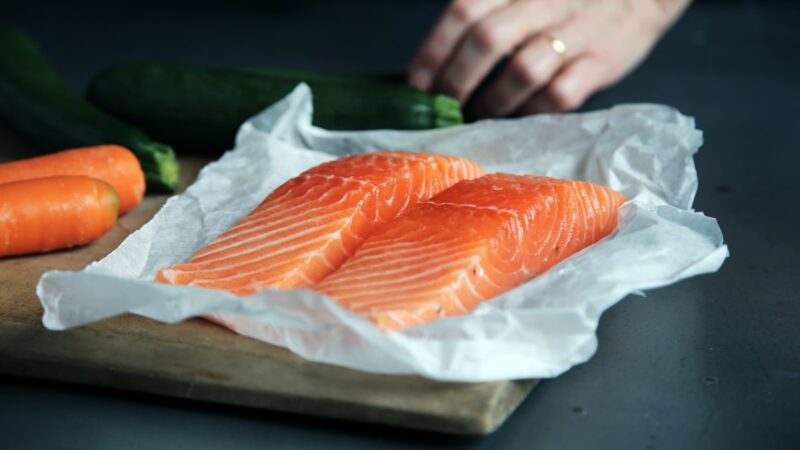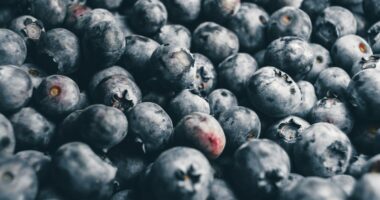When it comes to fats, it’s always – “watch what you eat, watch how much you eat”. We’re mostly warned about restricting fat consumption, but when it comes to Omega-3, the advice is always otherwise. That’s because Omega-3 fatty acids are the only type of fat that our bodies are not able to produce naturally. And because Omega-3 fatty acids are essential fats, we require them not just to thrive but survive too.
Relying on supplements won’t always help – it’s always best to look for natural sources of omega-3 fatty acids. With a proper, balanced diet, we can supplement our bodies with the daily recommended intake of omega-3 it requires. And thankfully, we have a number of foods (both plant-based and meat-based) that are loaded with omega-3 fatty acids. Let’s have a look at the foods that are naturally abundant in omega-3 fatty acids.
Foods Rich in Omega-3 Fatty Acids
Animal-Based Sources
Salmon
Salmon isn’t just rich in omega-3 fatty acids, but is also loaded with selenium, vitamin B, and vitamin D. Salmon is a fatty fish and is known for its delicious taste, making it a healthy addition to your meals. It contains almost 2050 mg of omega-3 acids in a serving of 11 g and is one of the best sources of long-chain omega-3 fatty acids. As compared to fish oil capsules, consuming freshly cooked salmon is way effective in supplementing our bodies with the required quantities of omega-3 fatty acids.
Oysters
Oysters belong to the shellfish family and are a popular ingredient in many delicacies in different cuisines across the world. Oysters are not just tasty but super nutritious as well. They have almost 300 mg in 100 g oyster servings. Along with omega-3 fatty acids, oysters are a powerhouse of zinc, copper, and vitamin B12 too.
Mackerel
Most of us consume mackerel for the protein they offer, but what quite a lot aren’t aware of is that they are super rich in omega-3 fatty acids too. They come under the ‘oily fish’ category and are typically known for their high omega-3 content. Mackerels have almost 4580 mg in a serving of 100 g. The best part about mackerel is the fish is super easy to cook easily – so you can easily add this delectable fish to your meals regularly.
Plant-based Sources
Flaxseeds
There’s a common misconception out there that only animal-based foods are rich in omega-3 fatty acids. However, there are many plant-based sources of omega-3 fatty acids, and flaxseeds are one of them. Flaxseeds are oily plant seeds and are loaded with omega-3 fats as well as omega-6 fatty acids. They have ample magnesium and fiber as well.
Soybeans
The most popular source of plant-based protein, soybeans, is loaded with omega-3 and omega-6 fatty acids, making them a wholesome food, especially for vegans and vegetarians. Apart from this, soybeans also include folate, magnesium, vitamin K, and riboflavin. Soybeans contain almost 1440mg per 100g serving. However, consuming soybeans in restriction is important, as excess omega-6 fatty acids may result in inflammation.
Walnuts
Among the nut family, walnuts are the ones with the highest omega-3 fatty acid content. Super nutritious and fibrous, 15 walnut halves contain almost 2600 mg of omega-3 fatty acids. They are also rich in vitamin E, managenes and copper, making them the best wholesome nuts you can add to your meals. So whether it’s a cake or a salad, you know what ingredient to add to make your food tastier and more nutritious – just a couple of walnuts, and you’re good to go!
Summing Up
Omega-3 fatty acids are an essential nutrient in our bodies as they help keep inflammation at bay. They effectively tackle free radicals in our bodies so that our organs are protected from the effects of inflammation. Prolonged inflammation is the root cause of many major ailments, such as diabetes, arthritis, and even heart ailments. With the presence of the right amounts of omega-3s in our bodies, our defenses against inflammation are high, cutting down our risk of falling prey to such lifestyle ailments.
We’ve listed animal-based and plant-based sources of omega-3 fatty acids. So whatever your food preferences may be, you can always consider adding these ingredients to your meals to help maintain the omega-3 fatty levels in the body.









